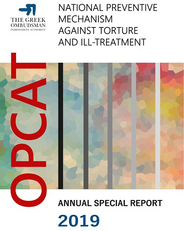Conditions in detention facilities continue to be insufficient as they diverge significantly from the european standards and guidelines set by international organizations. As a result, the fundamental principles and objectives of crime policy cannot be effectively met.
The main weaknesses are long-standing, including overcrowding in prisons, police station cells and pre-removal detention centers, understaffing, lack or limited access to necessary services for detainees, namely leisure activities, education, employment and training, unsuitable premises and persistence in protocols that are ill-suited for the treatment of mental patients. Furthermore, any identified improvements are piecemeal and, thus, insufficient to contribute to the overall improvement of detention conditions.
In 2019, a series of key organizational and legislative changes took place in crime policy. We should be able to attempt an initial assessment of the impact of those changes in 2020, namely of the two amendments of the penal code and the code of penal procedure and of transfer of competencies of crime policy from the Ministry of Justice to Ministry of Citizen Protection.
Over the years, the National Preventive Mechanism of the Greek Ombudsman has been set on providing an accurate, complete and well-documented report regarding the detention conditions in Greece and on issuing recommendations aiming at their improvement and their full compliance with the rule-of-law requirements of the 21th century legal civilization.
In order to fulfill its mission, the National Preventive Mechanism utilises all its available resources, including its available tools and provisions of the institutional framework, the expertise of its senior investigators and all available infrastructures.
In particular, the NPM is assisted by a significant number of its scientific staff, uses multi-member inspection teams and upgraded methodology and cooperates closely and consistently with its European counterparts and competent international organizations, namely the UN and the CoE.
After the initial mapping of detention facilities in the previous years, the Mechanism's operation has entered a new phase, functioning at multiple levels. In that light, apart from its regular inspections in all detention facilities, the Mechanism has adopted a more targeted and systematic approach in detention monitoring and has focused on those facilities that were associated with the most problematic findings according to the initial inspection and reporting. In this regard, the NPM annual special reports not only provide a snapshot of the detention conditions during the time of the inspection but already allow for a comparison of the findings of each inspection and an assessment of changes that have taken place over the years, in a short but adequate period of time that may vary from one to several years.
Aiming at upholding the fundamental rights, safety and dignity of all those in a state of detention, the National Preventive Mechanism of the Greek Ombudsman provides a well-documented reporting of relevant developments, highlights shortcomings, malfunctions and distortions and addresses crucial recommendations.
Source: The Greek Ombudsman

